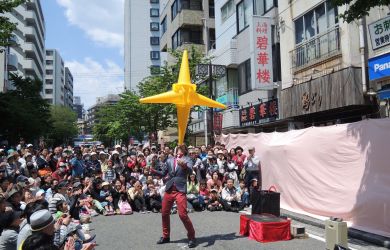
Originally published on metropolis.co.jp on September 2013

The projectionist carefully threads up a pristine new print of Fritz Lang’s black-and-white science fiction epic Metropolis. As the house lights go down, a musician perches himself at an organ boasting 4,623 pipes. It omits a thunderous chord as the silent film begins rolling. The projected image and live musical performance work together to transport viewers to a faraway future. The audience, dazzled by the clever special effects of the film, wonders, “How did they ever do that?”

This is not Berlin in January, 1927, but Yokohama in October, 2013. The upcoming screening of the classic film at Minato Mirai Hall will be accompanied by the sounds of American organist Peter Krasinski. “The art of silent movie accompaniment on the pipe organ is a rare but much cherished tradition in the US,” Krasinski explains, “and I am pleased to experience these most unique versions of the art in Japan.” The performance is just one example of countless unique cinema experiences available around Kanto, and confirms something that local fans have long known—Tokyo is one great place to catch a movie.
“What is so special about Tokyo theaters is the diversity,” says Atsushi Naito, owner of Cinema Vera in Shibuya. “You can see almost any movie from all around the world, even North Korea. In addition to this international diversity, you also have historical diversity with the National Film Center in Kyobashi and the many meizaga.” The Japanese term literally translates as “masterpiece theater” and the closest international equivalents are the revival houses that are rapidly disappearing across the US. When Naito lived in New York 25 years ago, they were practically uncountable. On his last visit, only the Film Forum remained. On the west coast, Quentin Tarantino purchased the New Beverly rather than allow one of the last remaining revival houses in Hollywood to close.
Although they are threatened by the specter of the multiplex, revival houses in Tokyo are still plentiful—something Naito says we should all be proud of. Plus, they offer a dazzling array of choices. Moviegoers can gorge themselves on ‘70s Italian horror, rediscover the magic of early silent films or lose themselves in a triple-feature of Audrey Hepburn classics that most fans know only on DVD.
The attractions are not only up on the screen. “There are a lot of events in Tokyo that bring international filmmakers to Japan,” says Koyori Suzuki, a writer for the online film magazine Movie And (www.eigato.com). “As a film writer, I’m never at a loss for story ideas. It really is a great environment for movies fans.” She also points to annual film fests, led by the Tokyo International Film Festival, but also including smaller ones dedicated to Scandinavian, French, Latin or gay and lesbian films—there are even fests and venues dedicated to short films and Tokyo’s aspiring filmmakers (foreign and Japanese).

Suzuki admits that foreign residents may be put off by ticket prices that are much higher than what they know at home, but recommends inexpensive film events hosted by embassies around Tokyo. She also frequents Gucci’s Cinema Visionaries series. The fashion company’s film foundation restores analog prints of classics such as Sergio Leone’s Once Upon a Time in America and Federico Fellini’s La Dolce Vita and presents them at the Gucci Gallery in Ginza. Maison Hermès Le Studio also offers screenings of French films in Ginza. Events at both venues are free, but online reservations are required (see sidebar).
Despite the diversity of film venues, things are in a state of transition. “At present, there are many attractive theaters in Tokyo,” says Mark Roberts, a film lecturer at Temple University Japan. “However, going forward they will come under increasing stress. It is highly likely that with the ongoing restructuring of distribution and exhibition, a number of the smaller theaters will close.”
Indeed, several of them already have. Ebisu Garden Cinema, the home-away-from-home for Woody Allen and Michael Moore, closed its doors in 2011 and European film stalwart Theatre Cinema in Ginza lowered its house lights for the last time this summer.

UNESCO statistics reveal that despite the long ticket counter lines you may encounter when you go to see The Wolverine this fall, theater attendance is actually slipping. For 40 years, Japanese people have been to movie theaters 2.0 times a year on average. Recently that number has fallen to 1.5, compared to 4.5 in Australia and 5.4 in the US. Roberts points to a lack of government support. “Despite its nationalist bluster, the Japanese government has very weak policies on film culture and no policy whatsoever on film education,” he explains. “This is visible in the low level of film literacy among young people in Japan, and the fact that many domestic productions can no longer be exported.”
Another factor is the rise of the multiplex, the first of which appeared in Japan in 1993 (Warner Mycal Ebina). They were first concentrated in suburban areas, where land is ample, but are now encroaching on urban areas. “They have many screens and book major Hollywood movies as well as art house cinema,” theater owner Naito explains. “So small theaters cannot book the kind of movies that they used to.” Yet another threat exists in the proliferation of multiplexes: the spread of digital distribution. As major studios pressure larger theaters to go digital, smaller ones either refuse or can’t afford the switch from analog. “Japanese major studios will someday decide to no longer maintain their 35mm print archives,” Naito muses. “That will mean the end of the revival house business.”
But a new generation of fans is working to postpone that day. Naito was pleasantly surprised when the crowd of men over 60 coming to his theater to see samurai flicks recently grew to include women in their 20s and 30s. “For the moment, there are lots of choices,” Roberts says, “and we should enjoy them while they last.
Read our full interview with organist Peter Krasinski.
Silver Screenings
Whatever you’re into, there’s a movie house for you in and around Tokyo
Brillia Short Shorts Theater
International short films with Japanese and English subtitles.
5-3-1 Minato Mirai, Nishi-ku, Yokohama
045-633-2151
www.brillia-sst.jp
Cine Switch
European cinema.
4-4-5 Ginza, Chuo-ku
03-3561-0707
www.cineswitch.com
Cinema Vera
Japanese samurai films, classic Hollywood.
1-5 Maruyamacho, Shibuya-ku
03-3461-7703
www.cinemavera.com
Eurospace
European cinema, Japanese independent films.
1-5 Maruyamacho, Shibuya-ku
03-3461-0211
www.eurospace.co.jp
Gucci Gallery
Free screenings of restored classic films.
4-4-10 Ginza, Chuo-ku
03-5469-6611
http://gucci-cinemaroom.com
Image Forum
European cinema, American cult films.
2-10-2 Shibuya, Shibuya-ku
03-5766-0114
www.imageforum.co.jp
Jack & Betty
Independent Japanese films, European cinema.
3-51 Wakaba-cho, Naka-ku, Yokohama
045-243-9800
www.jackandbetty.net
Maison Hermès Le Studio
Free screenings of French films.
5-4-1 Ginza, Chuo-ku
03-3569-3300
www.maisonhermes.jp/reservation/
Musashinokan
European cinema, American art house and exploitation films.
3-27-10 Shinjuku
03-3354-5670
http://shinjuku.musashino-k.jp
The National Film Center
Classic Japanese films. Closed for renovations until October 30.
3-7-6 Kyobashi, Chuo-ku
03-5777-8600
www.momat.go.jp
Shin-Bungeiza
Second-run Hollywood films, ‘70s horror and exploitation flicks.
3F, 1-43-5 Higashi-Ikebukuro Toshima-ku
03-3971-9422
www.shin-bungeiza.com
Waseda Shochiku
Second-run Hollywood films, classic European cinema.
1-5-16 Takadanobaba, Shinjuku-ku
03-3200-8968
www.wasedashochiku.co.jp
Tokyo Stories
Live performances, limited screenings and a close-knit community mean a variety of film events and meetups across the city.
The 26th Tokyo International Film Festival runs October 17-25 at Roppongi Hills and other venues.
http://tiff.yahoo.co.jp/2013/en/
American organist Peter Krasinski accompanies silent films “Metropolis” and “The Frightful Era of Kurama Tengu.” Oct 12, 4pm, ¥1,800. Minato Mirai Hall. 2-3-6 Minatomirai, Nishi-ku, Yokohama. Nearest stn: Minatomirai. Tel: 045-682-2020
The “Screen Beauties” series kicks off with three Audrey Hepburn films, September 28-October 18 at Shinjuku Piccadily and other theaters.
www.screenbeauties.com
The Pink Cow in Roppongi hosts screenings of short films and documentaries by independent filmmakers.
www.thepinkcow.com
The 10am Film Festival is an ongoing morning series of digitally-restored classic films at Toho Cinemas Roppongi and other theaters. Upcoming films include The Godfather and The Towering Inferno.
http://asa10.eiga.com/




-390x250.jpg)
